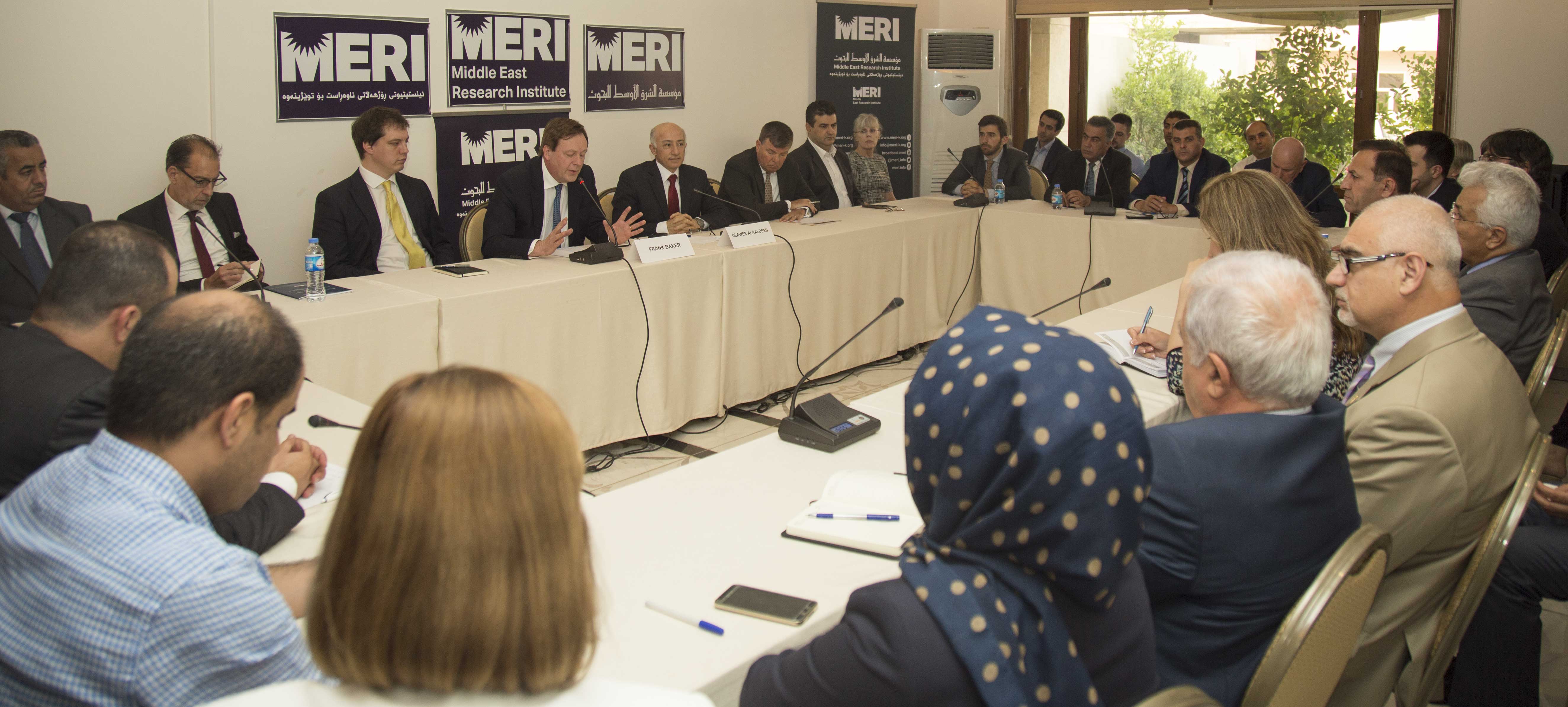Speaking in the Economic and Transparency seminar held by MERI, Frank Baker emphasized the necessity for cooperation between Iraqi and KRG political parties in order to address the current political and economic problems facing the region. Ambassador Baker showed a rather optimistic view on the current political situation in Iraq. Iraq is witnessing new patterns of alliances, and it could be the start of changing the Iraqi political scene. However, the problem lies in poor communication and interaction between government, parliament and other state institutions. He pointed out that many politicians are coming together to solve the political settlement in Baghdad, and he encouraged KRG policymakers and representatives to take this “historic opportunity” and overcome political and economic challenges with Baghdad.
The UK Ambassador Frank Baker’s Remarks at the Middle East Research Institute
He opined “Independence is a great legitimacy for the Kurds, but now is also a good time for Kurds to have a greater role in Baghdad”. Citing the Scotland referendum act, he accentuated that any independence referendum schemes must be based on agreement between Baghdad and the KRG. Moreover, he stated that the time is ripe for both sides to reach an agreement and solve their disputes on over the oil sector and other issues. Baker welcomed the recent agreement between two major KRG parties, PUK and Gorran, as a positive step towards resolving the Kurdistan Region’s problems”, creating coalition is a successful way to solve political rigidity in the region: “In the last week we have seen the PUK and Gorran move closer together, sitting down and agreeing a way forward where they can work together. I think it is a positive thing. I don’t think it should be seen as a negative thing in any way”.

Iraq’s economy is in a very fragile state, currently Iraq faces two main economic challenges, the cost of fighting ISIS, and plummeting oil prices, which Iraq solely depends on it to finance its budget. Likewise, the KRG faces the same challenges. The barriers are disagreement on oil exports and disputes over the budget. One way to move forward is to have a unified economic reform plan to identify many areas of reform; for example simplifying the taxation system, subsidy reduction, diversification away from oil dependency, and last but not least fighting corruption.
MERI’s seminar coincided with the anti-corruption summit in London, which sought to galvanize a global response to tackle corruption. Countries like Iraq suffer extremely from the costs of corruption. Frank Baker thinks one of the direct causes of this corruption is the size of public sector. Therefore, both the KRG and Iraq must cut jobs in the public sector, but simultaneously efforts must be made to ensure that the private sector thrives. However, Baker emphasized that this process must take place under the rule and regulation of international organizations to prevent any unfairness. In addition, the KRG must invite and incentivize international auditing companies to audit its oil sector to provide information on oil produced, sold, and so on.
Ambassador Baker highlighted that Iraq has the potential and ability to overcome the current crises and even become a regional power, due to it having abundant natural resources, gas, fresh water, and many unique historical sights. Also geographically Iraq ideally placed for free trade zones. Additionally, Iraq’s soil is highly fertile and if managed and cultivated wisely Iraq’s agriculture sector can be returned to its golden age of 15-20 years ago. However, bad governance will impede these attempts toward diversification.
* * * * *
ankara escort
çankaya escort
ankara escort
çankaya escort
escort ankara
çankaya escort
escort bayan çankaya
istanbul rus escort
eryaman escort
escort bayan ankara
ankara escort
kızılay escort
istanbul escort
ankara escort
ankara rus escort
escort çankaya
ankara escort bayan
istanbul rus Escort
atasehir Escort
beylikduzu Escort
About MERI: The Middle East Research Institute is Iraq’s leading policy-research institute and think tank. It is an independent, entirely grant-funded not-for-profit organisation, based in Erbil, Kurdistan Region. Its mission is to contribute to the process of nation-building, state-building and democratisation via engagement, research, analysis and policy debates.
MERI’s main objectives include promoting and developing human rights, good governance, the rule of law and social and economic prosperity. MERI conduct high impact, high quality research (including purpose-based field work) and has published extensively in areas of: human rights, government reform, international politics, national security, ISIS, refugees, IDPs, minority rights (Christians, Yezidis, Turkmen, Shabaks, Sabi mandeans), Baghdad-Erbil relations, Hashd Al-Shabi, Peshmarga, violence against women, civil society. MERI engages policy- and decision-makers, the civil society and general public via publication, focused group discussions and conferences (MERI Forum).

